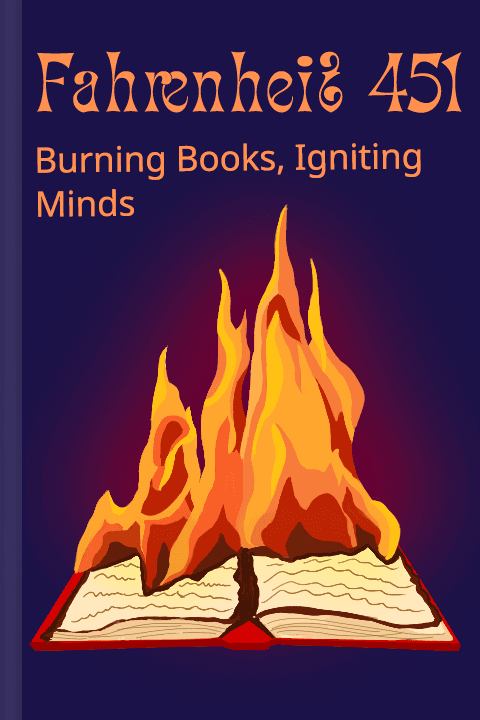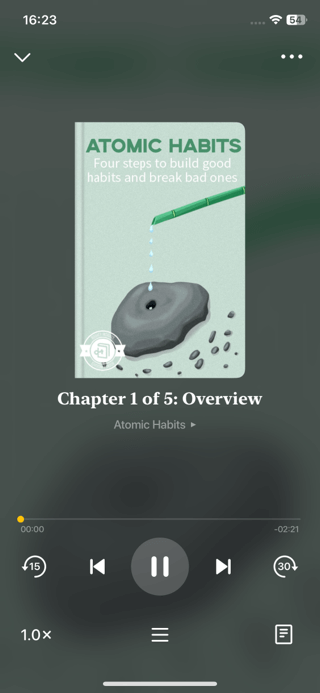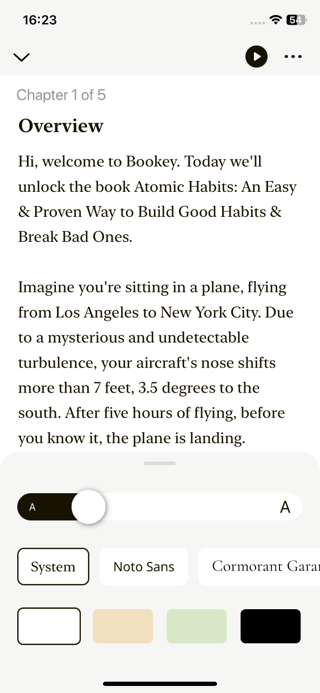Last updated on 2025/04/30
Fahrenheit 451 Summary
Ray Bradbury
Censorship, Conformity, and the Dangers of Ignorance.
Last updated on 2025/04/30
Fahrenheit 451 Summary
Ray Bradbury
Censorship, Conformity, and the Dangers of Ignorance.
Description

How many pages in Fahrenheit 451?
179 pages
What is the release date for Fahrenheit 451?
In a dystopian future where books are banned and 'firemen' burn any that are found, Ray Bradbury's "Fahrenheit 451" delves into the chilling consequences of a society stripped of intellectual freedom and critical thought. At the heart of this gripping narrative is Guy Montag, a fireman who begins to question the oppressive norms of a culture that glorifies instant gratification and suppresses individuality. As Montag awakens to the transformative power of literature, he embarks on a perilous journey toward enlightenment in a world that fears knowledge. Bradbury's provocative exploration of censorship, conformity, and the resilience of the human spirit serves as a haunting reminder of the vital importance of free thought in a rapidly changing world. Prepare to be challenged and inspired as you delve into this timeless classic that warns against the dangers of losing our humanity in the face of technological advancement.
Author Ray Bradbury
Ray Bradbury, an influential American author celebrated for his imaginative and often cautionary tales, was born on August 22, 1920, in Waukegan, Illinois. His unique blend of speculative fiction, fantasy, and horror allowed him to explore the complexities of human nature, society, and technology, themes that resonate throughout his work. Best known for his dystopian novel "Fahrenheit 451," published in 1953, Bradbury's writing is characterized by poetic prose and a deep concern for the preservation of individual thought and freedom in an increasingly conformist world. Over the course of his prolific career, he authored numerous novels, short stories, and plays, earning a lasting legacy as one of the most significant voices in 20th-century literature, with his works continuing to inspire discussions on censorship, identity, and the power of imagination.
Fahrenheit 451 Summary |Free PDF Download
Fahrenheit 451
Chapter 1 | 1
In the first chapter of "Fahrenheit 451," we meet Guy Montag, a fireman in a dystopian society where firemen burn books, which are illegal. The story opens with Montag experiencing a burning pleasure, reveling in the flames and destruction of literature. He returns to the fire station after a long day, playfully engaging in the rituals of his job while feeling an unsettling emptiness inside. As he walks home through the night, he encounters his curious neighbor, Clarisse McClellan, a seventeen-year-old girl who forces him to reflect on his life. Clarisse is a free spirit who enjoys nature and questions the world around her, starkly contrasting Montag's conformist society. Their conversation touches upon profound themes of happiness and connection; Clarisse asks, “Are you happy?” prompting Montag to question his contentment. Montag's internal struggle grows as he reflects on the emptiness of his marriage to Mildred, who is obsessively consumed by her television and disconnected from reality. Their relationship is superficial, highlighted by their inability to communicate meaningfully. When Montag returns home, he finds Mildred in a trance-like state due to her "Seashell" audio devices, symbolizing the shallow entertainment that dominates their lives. The narrative takes a darker turn when Montag struggles with the realization sparked by Clarisse: he is not truly happy. A traumatic incident at work, where a woman chooses to die with her books rather than let them be burned, deeply disturbs him. This act symbolizes the value of literature and the power of thoughts, and Montag finds himself at a moral crossroads. He has begun to secretly hoard books, bringing into question the societal norms he has participated in. In this chapter, themes of censorship, the desire for knowledge, and the quest for personal identity emerge. Montag’s encounters reveal the oppressive nature of his society, entrenched in conformity, and highlight the stark contrast between those who question the status quo, like Clarisse, and those who accept it without thought, like Mildred. As Montag grapples with his newfound awakenings, his journey towards self-discovery and rebellion against the oppressive regime begins to unfold.
Key Point: The importance of questioning one's happiness
Critical Interpretation: Imagine walking along a quiet street, the night air filled with the echoes of your own thoughts and uncertainties about life. Encountering someone who challenges your perspective, like Clarisse does with Montag, can ignite a spark within you, prompting deep introspection. You begin to ponder the true essence of happiness beyond societal norms, recognizing that fulfillment may not lie in superficial comforts but in authentic connections and meaningful experiences. This awakening compels you to seek out your passions, engage in thoughtful discussions, and forge deeper relationships, ultimately leading to a more enriched and purposeful life.
Chapter 2 | 2
In Chapter 2 of "Fahrenheit 451," titled "The Sieve and the Sand," the story unfolds in a tense atmosphere as Montag grapples with his newfound desire for knowledge and his realization of the emptiness surrounding him. As the cold November rain falls outside, Montag and his wife Mildred are depicted sitting in their stark, lifeless home, contrasting sharply with the dynamic, colorful world of entertainment that Mildred prefers. Montag is troubled by thoughts of his late neighbor, Clarisse, who had sparked his awakening to the world beyond the superficiality of their society. Montag struggles with his feelings of isolation and disconnection, expressing a yearning for genuine human connection. He tries to talk to Mildred about the books he has been reading, but she dismisses them as irrelevant, highlighting the theme of the struggle between individuality and conformity. A powerful moment arises when Montag reflects on the impact of books in contrast to the trivial nature of the entertainment offered by the digital "family" that Mildred engages with. As the dialogue intensifies, Montag’s frustration boils over. He begins to question everything around him, including the ongoing wars and the lack of compassion in society. This pivotal moment reveals his internal conflict; he is caught between the oppressive norms of his world and his desire for freedom and understanding. Feeling determined to act on his thoughts, Montag recalls a previous encounter with Faber, a retired English professor who offered him a glimmer of hope for a more meaningful existence through literature. He reaches out to Faber, seeking guidance and deeper understanding. Their conversation illuminates Montag’s desire for quality of thought and the importance of engaging with life's complexities. Faber expresses his fears and acknowledges his own cowardice but ultimately agrees to help Montag. Together, they discuss the need for action to disrupt the status quo of their society that tears away at the very fabric of human experience. Faber emphasizes the importance of three elements: quality of information, leisure to process it, and the right to act upon that knowledge. The chapter crescendos as Montag acknowledges the risks involved in his quest for deeper truth. He begins to envision a plan to print and distribute books, even suggesting the idea of sowing seeds of doubt among the firemen. His newfound determination is met with the realities of a society that has largely rejected literature for convenience and entertainment. As Montgomery prepares to confront Captain Beatty and the inevitable consequences of his actions, the chapter closes with him standing outside his home, caught between his old life as a fireman and the awakening he has experienced. The tension in the air speaks to the reader about the impending conflict between the oppressive forces of society and Montag’s burgeoning rebellion. The themes of isolation, the thirst for knowledge, and the oppression of conformity permeate this chapter, evoking a vivid image of a character in turmoil, standing on the brink of transformation.
Key Point: The importance of seeking genuine human connection and understanding
Critical Interpretation: In Chapter 2 of 'Fahrenheit 451,' you are reminded of the profound necessity to pursue true connections and seek deeper understanding in your life. As Montag feels increasingly isolated in a world of superficial distractions, it becomes clear that nurturing relationships and knowledge is essential for personal growth and fulfillment. This chapter inspires you to break away from the comfortable confines of conformity and embrace the complexities of life, valuing meaningful conversations and the sharing of ideas over the hollow exchanges of modern entertainment. By seeking out genuine interactions and engaging with the world around you, you can cultivate a sense of belonging and purpose, ultimately leading to a richer, more intentional existence.
Chapter 3 | 3
In the final chapter of "Fahrenheit 451," titled "Burning Bright," Guy Montag finds himself embroiled in chaos following his rebellion against the oppressive society that bans books. The narrative plunges into the turmoil as Montag confronts his former boss, Captain Beatty, who mocks his awakening. Beatty’s taunts push Montag to a tipping point, leading him to use a flamethrower against him, killing the fire chief. This act of defiance seals Montag's fate as a fugitive. Montag's inner turmoil escalates as he grapples with the loss of his wife, Mildred, who flees without looking back, and the wreckage of his former life. In a moment of desperation, he destroys his own home, hoping to obliterate the symbols of his old existence. The fire speaks to him, representing both destruction and purging, yet it also raises questions about his identity and future. As Montag escapes through the night, he feels the looming threat of the Mechanical Hound, a monstrous creature engineered to hunt those who defy the law. Seeking guidance, he reaches out to Faber, a former teacher, who provides advice on how to evade capture. Montag’s flight leads him to the river, where he washes away his past and adopts the identity of a survivor, ready to live beyond the constraints of society. Amidst the panic and fragility of the world collapsing around him, Montag stumbles upon a group of intellectual wanderers who, like him, cherish the lost knowledge of books. They embody the hope of rebuilding human consciousness in the aftermath of societal destruction. Granger, a leader among them, emphasizes the importance of remembering, recording, and preserving literature in their minds to prevent history from repeating itself. As they witness the city’s destruction, Montag embraces the opportunity for renewal represented by the phoenix symbolized by the ashes and memories of the past. The men unite, prepared to forge a new future from their collective understanding, filled with the possibility of growth and wisdom. They do not aim for immediate confrontation with the world, but rather seek to cultivate knowledge, preparing themselves for a day when society is ready to listen again. "Burning Bright" culminates in a reflection on the cyclical nature of human experience. Montag resolves to cherish the understanding that his struggles and memories will empower the next generation. The themes central to this chapter revolve around rebirth, the human spirit's resilience, and the eternal quest for knowledge, suggesting that even in the darkest moments, the flame of hope and understanding can ignite a new beginning.







